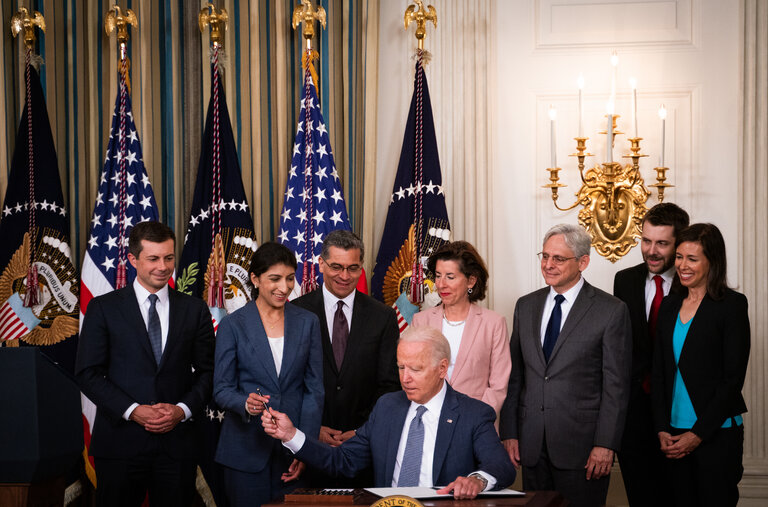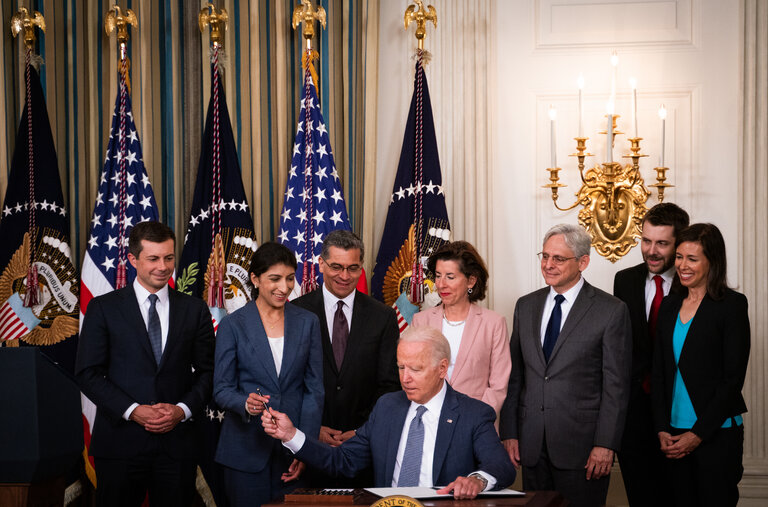Sunday, February 15, 2026
 Professional Photography and Event Coverage. experienced
Professional Photography and Event Coverage. experienced  Admission is currently on to Junior and Senior classes at Messiah high school.
Admission is currently on to Junior and Senior classes at Messiah high school.  Joel Rosenberg Calls for Prayer, Warns: the World ‘Is Going to Turn Against Israel’
Joel Rosenberg Calls for Prayer, Warns: the World ‘Is Going to Turn Against Israel’  Tope Alabi Speaks On Controversy Over Song Lyrics, ‘Aboru Aboye’
Tope Alabi Speaks On Controversy Over Song Lyrics, ‘Aboru Aboye’  Woli Arole raises alarm over ‘cabal’ in Nigerian gospel music industry
Woli Arole raises alarm over ‘cabal’ in Nigerian gospel music industry
Biden Urges More Scrutiny of Big Businesses, Such as Tech Giants

WASHINGTON — President Biden signed a sweeping executive order on Friday intended to increase competition within the nation’s economy and to limit corporate dominance, factors the White House says have led to higher prices and fewer choices for consumers while dampening pay and restricting the freedom to change jobs.
The administration encouraged federal agencies to take a wide range of actions, such as more closely scrutinizing the tech industry, cracking down on high fees charged by ocean shippers and allowing hearing aids to be sold over the counter.
“What we’ve seen over the past few decades is less competition and more concentration that holds our economy back,” Mr. Biden said in the White House on Friday, citing the agriculture, technology and pharmaceutical industries. “Rather than competing for consumers, they are consuming their competitors. Rather than competing for workers, they’re finding ways to gain the upper hand on labor.”
The order reflects the administration’s growing embrace of warnings by some economists that declining competition is hobbling the economy’s vitality. Progressive groups celebrated it, while some business groups criticized it harshly.
But Mr. Biden may find it difficult to address the decline in competition across diverse parts of the economy — including Silicon Valley, Wall Street, chain restaurants and large hospital networks — solely through executive action. Experts warn that in many areas, the president will need to work with Congress to change federal laws if he hopes to have more success than former President Donald J. Trump, who also issued competition-focused executive orders and who saw limited results from them.
Many of the agencies, such as the Federal Trade Commission and the Federal Communications Commission, mentioned in the Friday order are independent, meaning the White House can only encourage them, not direct them, to take specific steps. But in statements on Friday, those agencies largely embraced the proposals and promised to take action.
In interviews this week, senior administration officials acknowledged the limitations of executive authority but said the order focused on actions, like directing federal regulators to take steps to boost competition, that had the best chance of success in driving change across the economy.
The order includes 72 provisions stretching across disparate sectors of the economy. One part of the order tells the federal agencies that approve mergers that they should update their guidance for vetting deals to better capture technology companies’ business models. Another asks the Federal Communications Commission to reinstate so-called net neutrality rules for broadband providers. Yet another asks the Federal Trade Commission to stop manufacturers from blocking farmers from repairing their tractors on their own.
Other parts target health care at several levels. The order supports states and tribal governments that allow the importing of lower-cost prescription drugs from Canada, pushes to allow hearing aids to be sold over the counter and asks the F.T.C. and the Justice Department to more stringently scrutinize hospital mergers to ensure that patients are not harmed by them.
Another focus are the companies that move people and goods around the world. The order encourages new rules governing airline fees, for example. The airline industry consolidated substantially in the 2000s and early 2010s, with a series of mergers and acquisitions creating four large carriers that now serve almost two-thirds of all U.S. passengers. The order also asks the Federal Maritime Commission, an independent agency, to aggressively enforce law against companies that charge exporters high prices to transport their products by sea.












